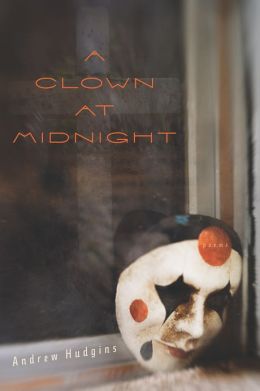The performance is over; the applauding audience is now asleep at home, dreaming of fire eaters, trapeze artists, and dancing elephants. So what does a clown do at midnight?
Down these mean streets a bad joke walks alone,
bruised head held low, chin tucked in tight, eyes down,
defiant. He laughs and it turns into a moan.
His wife left years ago, and his kids all groan,
claim they have never heard of him, and frown,
Down these mean streets a bad joke walks alone…
What does a clown do after midnight? He uses rhyme, and homonyms, poetic lines all ending in the same sound, a new formalism that seems almost offhand, deliberately careless, but still very tightly structured and controlled.
A Clown at Midnight: Poems is Andrew Hudgins’s new collection, officially published today by Houghton Mifflin Harcourt. Hudgins, who teaches at Ohio State University, has a considerable number of works behind him. He’s been a finalist for the National Book Award and the Pulitzer Prize, and a recipient of fellowships from Guggenheim and the National Endowment for the Arts.
In this collection, he’s assembled a broad array of poems, ranging from the dark to the playful, from the humorous to the deadly serious, often mixing these elements to create a work that is both entertaining and provocative.
Some of the poems, like “Now and Almost Now, ” are beautiful in their simplicity:

cars glow, and a paper
heavy with yesterday,
reposes on the walk.
A boy plodding
toward a bus quickens
to a differential jog.
Already golden,
the soft morning
starts to harden
around a summer
tanager eclipsed
by reddening oaks,
a few leaves
already golden
themselves. The door,
then the storm door,
creak open, the hinges’
high note lower
than the summer tanager’s.
In many, perhaps most, of these poems, Hudgins clearly has fun with words, the lines of some poems ending in almost exactly the same sound, like the ringing of church bells.
The subjects of many of the poems strike a serious note — being laid off, divorce, visiting an old love, dysfunctional family members, a funeral. Yet, even here, Hudgins can barely keep the humor, sometimes sardonic, in check, as he wraps playful words and sounds around his subjects and themes.
The title of the collection is taken from a line by Lon Cheney, Sr: “the essence of true horror is a clown at midnight.” And yet even that contains a combined sense of playfulness and sadness; the true horror would be a clown with no audience, no one to laugh at his antics, a clown at midnight, indeed.
Or perhaps a poet.
A Clown at Midnight is a fascinating, original collection, with poems that often demand a second and third reading, preferably aloud.
And preferably at midnight.
Photograph by TarahDawdy. Sourced via Flickr. Post by Glynn Young, author of the novels Dancing Priest and the recently published A Light Shining.
Browse more Poets and Poems.
Browse humorous poems and poetry humor.
________________
Buy a year of happy work mornings today, just $5.99. In June we’re exploring the theme Mirror, Mirror.
- Poets and Poems: Louis MacNeice and “Autumn Journal” - January 30, 2025
- “What Remains: The Collected Poems of Hannah Arendt” - January 28, 2025
- The Collected Poems of J.R.R. Tolkien - January 23, 2025

L. L. Barkat says
“the true horror would be a clown with no audience”
i kept coming back to that line.
And then…
“Or perhaps a poet.”
And then, I thought how each captures something so deep about our individual humanity. Even if we are shy, we somehow need audience. And when denied it, especially in close relationship (hinted at in the top poem), it is especially painful.
Poignant, Glynn.